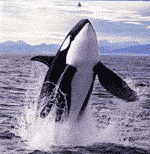Sunday 31 July 2005
Cetaceans (Whales and dolphins)

Thought to be once living on land,
cetaceans have evolved to the aquatic life. Many cetaceans can dive for long periods and to great depths. Unlike humans, who can't dive too far down or stay under for too long or else too much nitrogen will be dissolved into our bodies, the cetaceans are not breathing pressurized air as is the scuba (self-contained underwater breathing apparatus) diver. The cetacean actually just holds its breath under water, so the air to be dissolved into its body, slowly decreases.The disease human divers can get from staying too long or too deep is called the caisson disease, altitude sickness, or the bends. A few cetaceans are believed to be the most intelligent non-primates and many have
proportionately larger brains.
(more)
You can help spreading the word about this animal by liking it on facebook
Permanent Link
Tuesday 26 July 2005
Tamanduas (Genus Tamandua) - Tree-living Anteaters
 Anteaters (Myrmecophagidae) are members of a very special group of mammals - the Xenarthrans - quite unusual and conspicuous animals, such as Sloths (Pilosa) and Armadillos (Dasypodidae). There are just 29 Xenarthran species left nowadays, but this group has been one of the most dominating mammal orders in South America during the tertiary period.
Anteaters (Myrmecophagidae) are members of a very special group of mammals - the Xenarthrans - quite unusual and conspicuous animals, such as Sloths (Pilosa) and Armadillos (Dasypodidae). There are just 29 Xenarthran species left nowadays, but this group has been one of the most dominating mammal orders in South America during the tertiary period.
(more)
You can help spreading the word about this animal by liking it on facebook
Permanent Link
Sunday 03 July 2005
Weblog added to TheWebsiteOfEverything.com
I have decided to set up a weblog to inform and entertain people about mammals that live in our
world. Each day i plan to put one species in the spotlight and give you information about that animal.
Please visit the log at
www.thewebsiteofeverything.com/weblog/ and tell me what you think. I am really curious.
You can help spreading the word about this animal by liking it on facebook
Permanent Link
 Thought to be once living on land, cetaceans have evolved to the aquatic life. Many cetaceans can dive for long periods and to great depths. Unlike humans, who can't dive too far down or stay under for too long or else too much nitrogen will be dissolved into our bodies, the cetaceans are not breathing pressurized air as is the scuba (self-contained underwater breathing apparatus) diver. The cetacean actually just holds its breath under water, so the air to be dissolved into its body, slowly decreases.The disease human divers can get from staying too long or too deep is called the caisson disease, altitude sickness, or the bends. A few cetaceans are believed to be the most intelligent non-primates and many have proportionately larger brains.
(more)
You can help spreading the word about this animal by liking it on facebook
Thought to be once living on land, cetaceans have evolved to the aquatic life. Many cetaceans can dive for long periods and to great depths. Unlike humans, who can't dive too far down or stay under for too long or else too much nitrogen will be dissolved into our bodies, the cetaceans are not breathing pressurized air as is the scuba (self-contained underwater breathing apparatus) diver. The cetacean actually just holds its breath under water, so the air to be dissolved into its body, slowly decreases.The disease human divers can get from staying too long or too deep is called the caisson disease, altitude sickness, or the bends. A few cetaceans are believed to be the most intelligent non-primates and many have proportionately larger brains.
(more)
You can help spreading the word about this animal by liking it on facebook 
 Anteaters (Myrmecophagidae) are members of a very special group of mammals - the Xenarthrans - quite unusual and conspicuous animals, such as Sloths (Pilosa) and Armadillos (Dasypodidae). There are just 29 Xenarthran species left nowadays, but this group has been one of the most dominating mammal orders in South America during the tertiary period.
Anteaters (Myrmecophagidae) are members of a very special group of mammals - the Xenarthrans - quite unusual and conspicuous animals, such as Sloths (Pilosa) and Armadillos (Dasypodidae). There are just 29 Xenarthran species left nowadays, but this group has been one of the most dominating mammal orders in South America during the tertiary period.